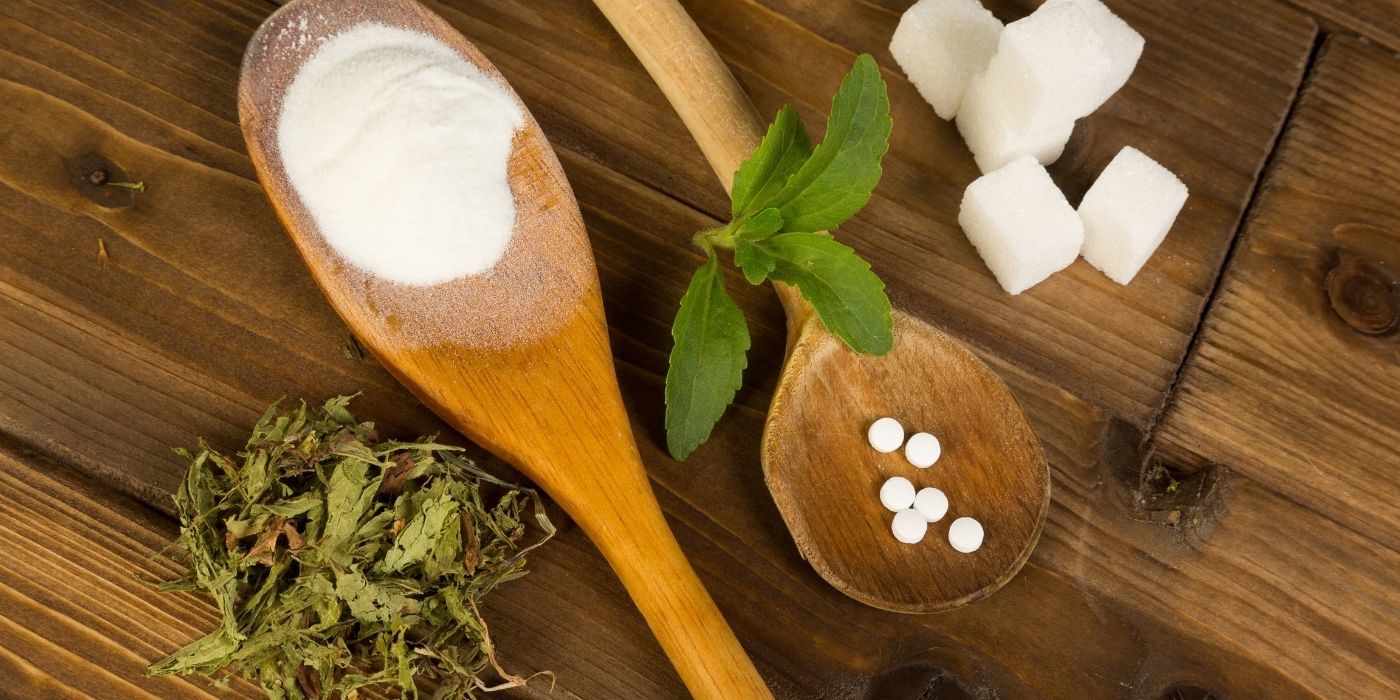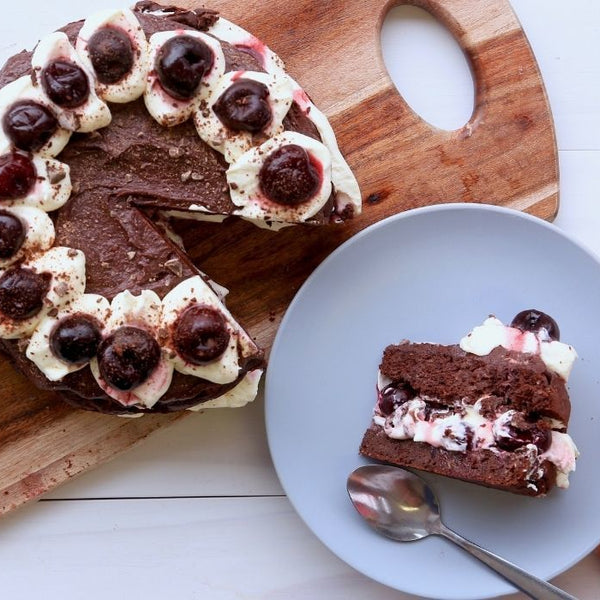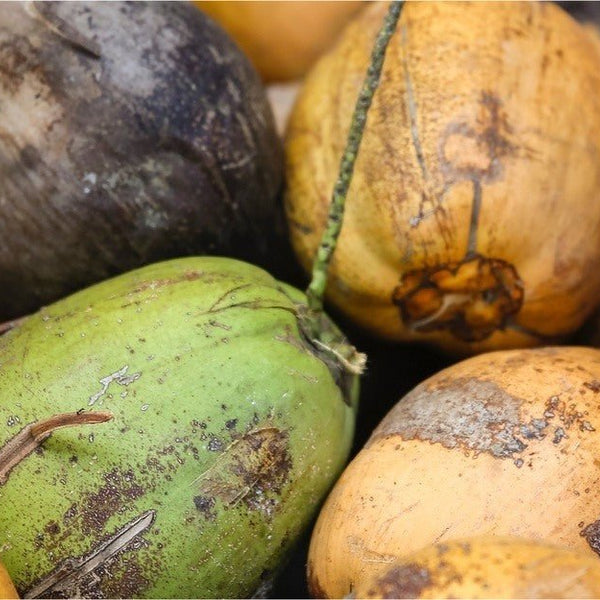
The Best Keto-Friendly Sweeteners
With so many sugar alternatives out there, it can be confusing to know what the best keto-friendly or low carb sweeteners are.
When you're cutting down on carbs, or switching to a keto lifestyle, what do you replace sugar with when you want a little sweet treat?
We suggest primarily using stevia, erythritol and xylitol as the best keto-friendly / low carb alternative natural sweeteners. These sweeteners are all-natural, low carb and low calorie, and they don't have a significant impact on blood sugar levels or insulin response.
What are our favourites...
The top Keto Friendly sweeteners are...

Stevia
It's completely natural, has zero carbs so it doesn't raise blood sugar levels, and has no calories. Steviol glycosides are extracted from the stevia plant, which you can get in its pure form as liquid drops or a fine green or white powder, or mixed in with a sugar alcohol like erythritol to form granules that look just like white sugar.
Stevia has been used for hundreds of years, and the consensus is that it is safe. It's around 300 times sweeter than sugar, so you only need a little bit. Even though it's sweet, it has a different taste to sugar, which is why it's used in small quantities and is often combined with sugar alcohol such as erythritol.
You can find stevia in Natvia which contains a blend of stevia and erythritol, in Well Naturally No Added Sugar Chocolate, in the Zevia soft drink, and our Sugar-Free Icing Mix which is a mix of stevia, erythritol and xylitol. Its also found in many keto-friendly recipes
Erythritol
Erythritol is a sugar alcohol (biochemically called a polyol) that is low calorie and low carb. But, unlike the name suggests, it isn’t sugar or alcohol. It looks just like sugar, but it is only partially digested and absorbed by the body, and once it's absorbed the body doesn't use it.
It occurs naturally in many plants, and commercially it is commonly produced from corn. It’s about 70% as sweet as table sugar, and you can get it in granular form on its own or mixed with stevia which makes it taste sweeter, such as Natvia. We use it in our Sugar- Free Icing Mix. It's great for baking and has a very similar taste to sugar, so it works well sprinkled on low carb pancakes or mixed in with cocoa to make a hot chocolate.
Xylitol
Another popular keto-friendly sweetener, is xylitol, a sugar alcohol naturally found in lots of different fruits and vegetables and is commercially produced from corn or the birch tree. It's low carb (but not no carb), and also has more calories than other sugar alcohols such as erythritol. But, it contains fewer calories than regular sugar, even though it's just as sweet as sugar (xylitol contains 2.5 calories per gram compared to 4 calories per gram for table sugar). It is still very low GI and low carb, so it still has a minimal impact on blood sugar and insulin levels. Xylitol makes a great sweetener for coffee or tea.
Only 50% is absorbed in the small intestine and the other half is fermented by bacteria in the large intestine. Because of this, it may cause some digestive issues like bloating when consumed in large amounts. Xylitol is safe for humans, but it is toxic for cats and dogs, so be careful to keep xylitol far away from pets.
Monk Fruit
Monk fruit has become super popular lately as one of the best keto-friendly sweeteners. Monk fruit is a melon-shaped fruit native to south-east Asia, also called Luo Han Guo. It was traditionally used by Buddhist monks (which is where it gets its name from). It has zero calories, which is great if you’re watching your weight, and zero carbs, which is good if you’re diabetic. You can now find this sweetener in the supermarket as well as health food stores e.g. Raw Earth Stevia & Monk Fruit Natural Sweetener or find it blended with other sweeteners like Lakanto Monk Fruit Sweetener which is mostly Erythritol and 1% Monk Fruit.
It is a good option, but does have a slightly fruity taste and can be more expensive because it's harder to source.
What else is out there...
Maltitol - why it isn’t the best
Maltitol is a sugar alcohol, but it isn’t the best option compared to the others. Firstly, it has more calories than most sugar alcohols (about two-thirds of the calories in sugar, which is quite a lot for a low carb sweetener). Secondly, because it is partially absorbed in the small intestine, it can raise blood sugar levels, which isn’t ideal for people with diabetes. The other part which isn’t absorbed is fermented in the large intestine, which can cause bloating in some people.
It’s less expensive than other sugar alcohols, which is probably why it is commonly used in commercial low carb bars like Atkins bars and Aussie Bodies Protein Bars. However, these bars might still be a good low carb option for you, especially if you’re trying to get off the Snickers and Mars bars.
If consuming a product that contains maltitol helps make healthy/ low carb eating easier for you and causes no digestive issues, then as an occasional treat here and there, enjoy! I occasionally have one of these when I’m craving a chocolate bar (when dark chocolate just won’t do!)
Why agave syrup, honey, maple syrup, brown sugar and rice malt syrup don’t stack up...

Dates and other dried fruits are still full of sugar, and will trigger an insulin response and spike in blood sugar just as sugar does. The same goes for coconut sugar, coconut aminos, rice malt syrup and maple syrup. They're natural, but so is sugar (which is naturally derived from sugar cane).
Brown sugar and molasses are just a form of cane sugar, and will still raise blood sugar levels. Even if they’re lower GI (although rice malt syrup is high GI), or have some extra nutrition (such as molasses which contains iron, calcium, magnesium, vitamin B6, and selenium), they're still going to impact your blood sugar levels, have an insulin response, and contribute calories.
Agave syrup is really just a fancy, expensive version of high-fructose syrup. It's the same sugar used to make tequila, is very high in fructose. There have been several debates about whether fructose is worse for your health than glucose. Whether it is or not, in the end, sugar is sugar and agave is just as unhealthy as sugar.
Sorbitol
We sometimes use Queen Sugar-Free Maple Syrup on our pancakes, as it is the only commercially-available sugar free maple syrup on the market. It contains sorbitol, a sugar alcohol made from glucose, and sucralose, an artificial sweetener. While these aren’t the best sweeteners, it still may be a better option for people who want to put maple syrup on their Low Carb Protein Pancakes without drowning them in high sugar maple syrup.
Peter's No Added Sugar Ice Cream, which is also pretty good on low carb pancakes, also contains sorbitol. Chewing gum like Extra contains sorbitol, but there are gums sweetened with xylitol that are starting to gain popularity because of the health claims about xylitol being good for tooth health.
Artificial sweeteners such as aspartame, sucralose and saccharin

Whilst these would be considered keto-friendly - The consensus is still out about the safety of artificial sweeteners, but they are still approved by FSANZ and the FDA and are common in low-calorie foods. Aspartame is one of the most common artificial sweeteners in use today. If you’ve used an Equal in your coffee or ever had a Diet Coke, you’ve had aspartame. There are lots of claims that aspartame is bad for your health, but even though some studies have raised concern about the link to aspartame to cancer and other health concerns, the Australian Institute of Food Safety says there is nothing to worry about. Sucralose is the artificial sweetener in Splenda, and is also used in Queen Sugar Free Maple Syrup, and saccharin is in Sweet'N Low.
What’s dextrose?
Dextrose is chemically exactly the same as glucose. It's a simple sugar made from corn, and is common in processed foods. It's often added as a filler, so be wary of foods containing dextrose, as they could still raise your blood sugar levels. It's also brewers sugar used to brew beer.
What about no sweeteners?
How about limiting all sweeteners? Even if they don’t have a huge impact on blood sugar, they can trigger a dopamine response which can make you crave sweets. Some studies show that consuming sweeteners like diet drinks might make it harder to lose weight. On the flip side of this, there are also studies that show that diet soft drinks on occasion cause no serious harm and can help in adherence to a reduced-calorie diet (weight loss)
There is also some evidence to show some sweeteners may damage gut bacteria.
While sweeteners such as stevia and erythritol don’t contain calories, it's important to be mindful that you're still adding them to foods that contain calories. You still need to consider what you're eating with the sweetener which contributes calories.
Sweeteners can help you stay low carb
The good thing about alternative sweeteners like stevia and sugar alcohols is they can really help you get off sugar if you are wanting to cut it out.
Not everyone who wants to cut out sugar wants to miss out on the odd sweet treat now and then, so including sweeteners into your eating plan makes it easier to transition into a low carb/ keto way of eating and not have those feelings of missing out.
I’ve found that switching to low carb sweeteners has helped me reduce how much sweetness I need to add to foods, and it's really helped improve my blood sugar levels. Low carb sweeteners are a good option if you want to stay low carb while allowing yourself to have a sweet treat every now and then without compromising your macros or impacting your blood sugar levels.
Like anything, it’s important to choose what is best for you and your health goals. If you are looking for low carb, keto-friendly sweeteners, we hope this blog has been helpful.


